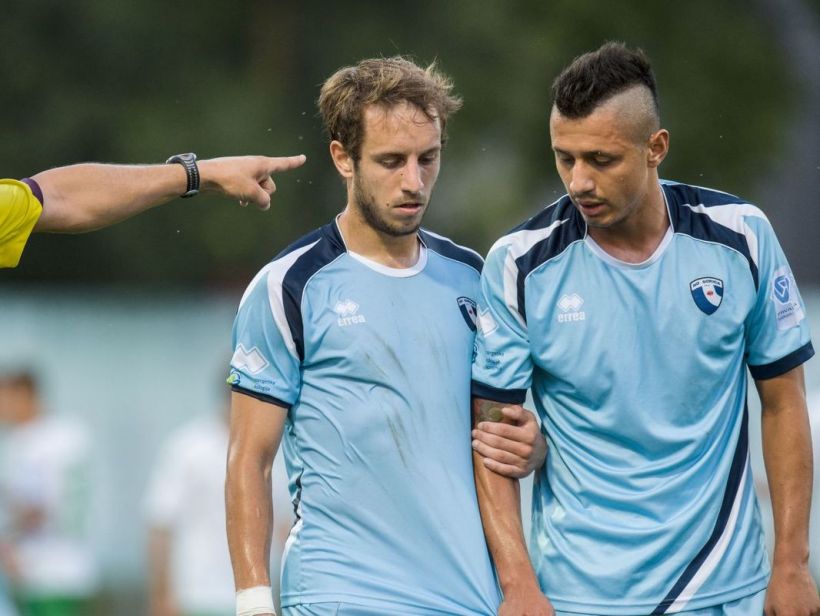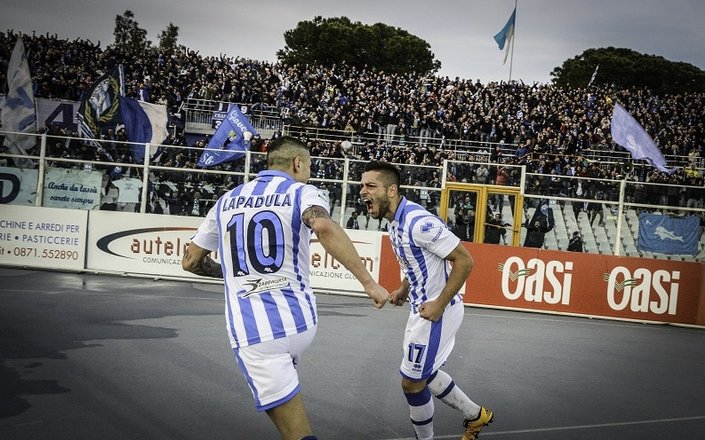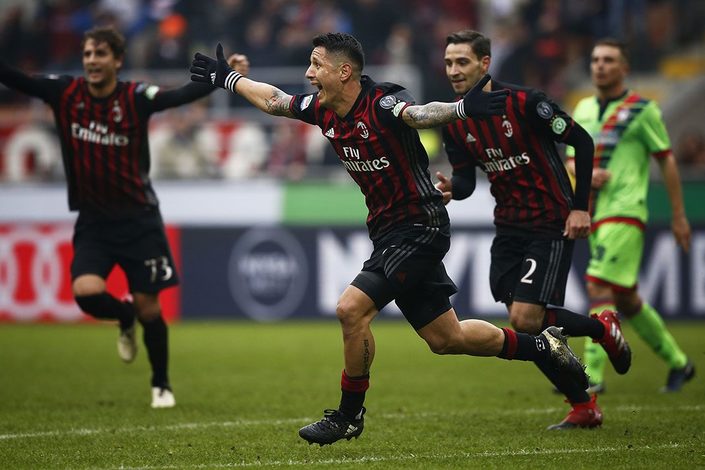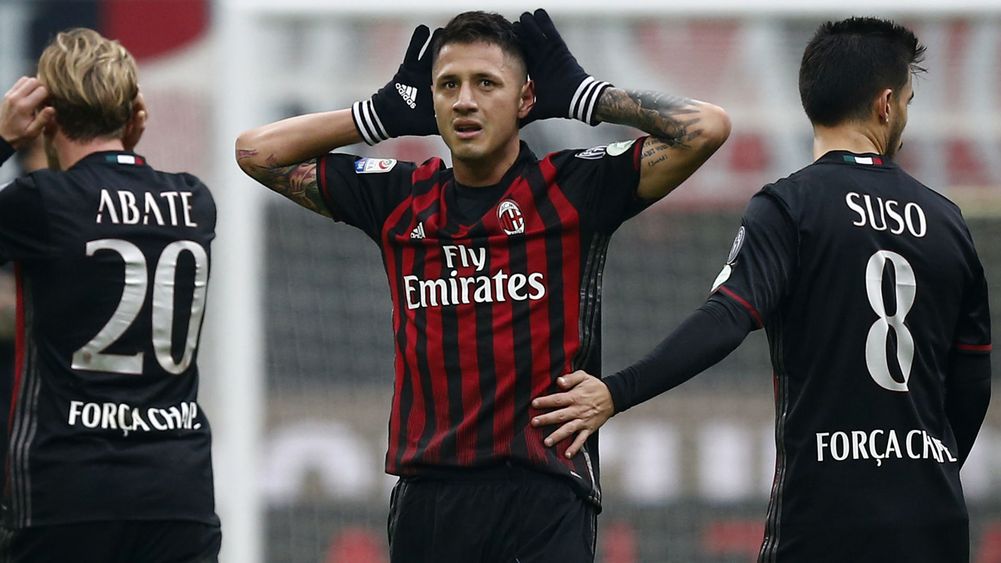How does one describe an individual who has faced nothing but uncertainty, obstacles and doubt, only to emerge triumphant? Resilient, and it’s one of the many adjectives befitting of AC Milan’s ambitious number 9, Gianluca Lapadula.
On the 8 January 2017, Vincenzo Montella’s resurgent Rossoneri played their first Serie A fixture of the New Year. Inside the comforts of the majestic Stadio San Siro, odds were stacked in favour of a home win, especially against a Cagliari side who had struggled on their travels all season. With every missed chance, however, Milanisti sensed the narrow gap between their beloved club and league rivals expanding. Searching for a breakthrough, Montella’s third substitution was summoned in the 79th minute. Pushing players forward and hankering for a winning goal, Milan engineered a match-winning moment.
The ball was crossed in from the right towards Lapadula, who controlled in the penalty area and swivelled, only to see his shot blocked. Then, in a moment of brilliant improvisation, Lapadula – who had fallen onto his back knee in the process – toe-poked the ball towards Carlos Bacca who scored and secured Milan a 1-0 victory. Lapadula’s timely assist from the bench was yet another example of his tenacity and grit to impact the outcome of the match. This same drive has laid the foundations for his career.
Born in Turin to an Italian father and Peruvian mother, Lapadula’s footballing journey began in the Juventus youth system. Like many who start at the Bianconeri, he dreamt of mirroring his idol Alessandro Del Piero. “My example on and off the pitch has always been Del Piero,” he told La Repubblica, “A champion from every point of view.”
As an adolescent 14-year-old with aspirations of emulating Il Pinturicchio, Lapadula’s studies suffered, leading to a dismissal from Juve’s academy. After being released, a series of unsuccessful stints up and down the lower-tiers of Italian football casted some doubt about whether he was cut out for top-flight football.
Laboured and unglamorous spells with Rivoli Collegno, Treviso, Pro Vercelli and Ivrea seemed to have paid off after Lapadula returned to a Serie A club, dropping anchor with Parma in 2009. Yet, the reprieve would prove short-lived.
When it comes to transfer regulations, Italian football has only recently rectified its once peculiar and complex system. Unfortunately for Lapadula, he was at the heart of this system. Acting Crociati owner Tommaso Ghirardi shipped the fiery forward out on various loans to Atletico Roma – dissolved in 2011 – and Ravenna; two stints that yielded few results worthy of mention. A half-season in the Italian capital was followed by an 18-month stay in Serravalle with San Marino. The move proved the key to unlocking Lapadula’s true scoring potential; netting an impressive 24 goals in 35 matches for the Titani during the 2011-12 campaign.
Intrigued by the gallivanting bomber, Serie B outfit Cesena acquired him on a co-ownership deal that summer, and he would only return to Parma after brief cameos with the Seahorses and later Frosinone. Unsurprisingly, Lapadula felt like a pawn to his many employers in Italy and even described himself as a “bargaining chip.”
Although struggling to makes ends meet, his strong will to achieve never wavered. Determined to stake his claim on a successful career, Lapadula set out for pastures new, carrying his untapped talents outside of the Italian peninsula to Slovenia.
While calcio was all he knew, a move to ND Gorica in July 2013 was a blessing in disguise. A striker by trade, Lapadula flipped between wings with Gorica, and still managed a respectable 11 goals in 27 appearances.

Read about Lapadula’s (right) time at ND Gorica, and the Slovenian club’s peculiar partnership with Parma by clicking on the image.
In July 2014, Lapadula headed back to Italy, tending to unfinished business by linking up with Teramo on loan. His return to the peninsula saw no shortage of goals and his tally of 21 strikes played a significant role in the Abruzzese securing top honours in Lega Pro Group B, clinching promotion to Italy’s second division.
Achieving promotion should be a symbol of pride, success and achievement, no matter the level or trade. Yet for Teramo, it was anything but, and their rise was mired in controversy. Executives from both Teramo and Savona – their opponents on 2 May 2015; the day Teramo sealed promotion – were subjected to search warrants over possible sporting fraud (match-fixing). According to The Sports Integrity Initiative, high-ranking executives were alleged to have altered the outcome of the match, allowing Teramo to gain direct promotion to Serie B prior to the conclusion of the Lega Pro season. After the dust settled, promotion was revoked and Teramo were stripped of their league title.
Meanwhile, Lapadula’s parent club Parma were in the midst of another financial crisis. And sadly, it was a long time coming. Denied a licence by UEFA to compete in the 2014-15 Europa League, and guilty of negligence regarding their income tax payments on player salaries – among other financial mismanagement – ,Parma officially declared bankruptcy in what turned out to be the sombre dismemberment of a historic club. As a result of the bankruptcy, players’ rights no longer belonged to the 1999 UEFA Cup winners, declaring them all free agents.
Unemployed yet still yearning for more, Lapadula’s life and career would change forever with the stroke of a pen and the signing of his next contract.
Under the guidance of vibrant ex-Milan defender Massimo Oddo, the Abruzzo-based club Pescara fancied Lapadula, striking a four-year deal in July 2015. Having spent a year coaching the Delfini’s Primavera, Oddo had been handed the reins to the first-team. The 2006 World Cup winner was appointed head-coach three months prior to Lapadula’s arrival and together, the high-strung duo formed a bond that would take Serie B by storm.
The years Lapadula spent oscillating between Italy’s lower leagues and struggling for goals were soon forgotten. During the 2015-16 season, the Italian forward made up for lost time, bagging an astonishing 30 goals in 44 matches for the promotion hopefuls. His exploits earned him capocannoniere honours as the division’s top scorer. But more importantly, his historic season helped the Biancazzurri to promotion to Serie A – and this time there were no controversies or scandals weighing Lapadula down.

Lapadula celebrates another goal under the Curva Nord of Pescara’s Stadio Giovanni Cornacchia
Suddenly, Lapadula was a revelation and his prolific season in Serie B fuelled major interest from Italy, England and Spain in the summer transfer window. Claudio Ranieri’s Premier League winning Leicester City, world giants Barcelona and Italian elitists Juventus, Napoli and AC Milan were all said to be among the suitors.
Strapped for cash amid talks of a club sale by president Silvio Berlusconi, the Rossoneri appeared to be an unlikely destination. However, On 1 July 2016 in a shock swoop, Milan landed the man who has been dubbed by some media outlets as the “Italian Jamie Vardy.”
“Seeing [Adriano] Galliani and their headquarters really had an effect on me,” Lapadula told Milan TV. “I saw many trophies and it played a role in the deal…it was love at first sight.”
Lapadula has been at the heart of the Milan’s revival this season, and he currently has four goals and two assists in 12 appearances. His first goal in Rossonero, an 82 minute back-heel to sink Palermo at the Stadio Renzo Barbera 2-1 was later rewarded with a call-up to Giampiero Ventura’s Italy squad.
But it was his first goal in front of his home crowd that perhaps encapsulated how and why Lapadula has come so far. In the 86th minute versus Crotone – a club he had previously haunted with 3 goals in Serie B – he scored Milan’s winner, instantly endearing himself to the San Siro faithful. It wasn’t so much the quality of goal, but rather the way he expressed his emotion after the final whistle sounded; exuberance and jubilation in its purest form.
Humble, self-less and determined, Lapadula explained to Sky Sport Italia that “I’m in good form, but I haven’t done anything yet. This is just the start of our important journey together.”

Lapadula wheels off in delight after scoring Milan’s winner against Crotone in December 2016
Behind every successful footballer lies an even better story; a tale of overcoming adversity, struggle and doubt. Footballers are not superheroes. Like the average human, they encounter obstacles. This was no different for Lapadula, who has risen from uncertainty in the depths of Italian football to the grand stage of Serie A.
Looking back, we can reflect and ask ourselves “what if?” What if Lapadula had decided against embarking on that adventure to Slovenia? Would he have moved to Pescara and enjoyed such a successful season had he not overcome the lows of fraud and financial troubles that bedevilled his former clubs? Without these transformative experiences, would Lapadula still be searching for the top instead of deciding matches for Milan?
The story of Gianluca Lapadula’s career is fit for Hollywood and follows a similar narrative to that of his favourite film, ‘Braveheart’. Milan’s number 9 has admitted to watching the 1995 epic “hundreds of times”, and his admiration of the protagonist William Wallace – a Scottish warrior who leads the Scot’s resistance against English rule in the 13th century (played by Mel Gibson) – even prompted his older brothers to nickname him, ‘Sir William’.
Indeed, it would appear Lapadula attempts to evoke the unyielding spirit of William Wallace every time he steps onto a football pitch. He is living his very own modern-day underdog story, and the public can’t wait to discover what chapter he writes next.

